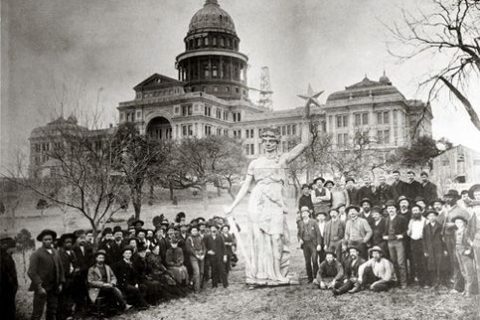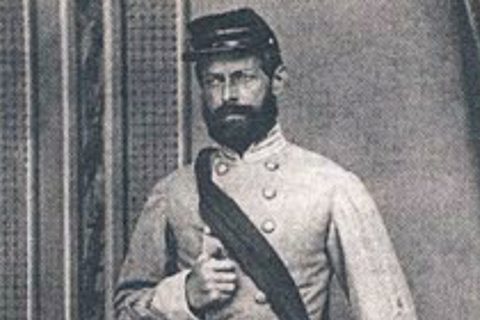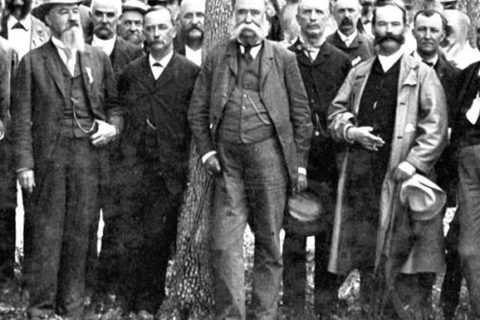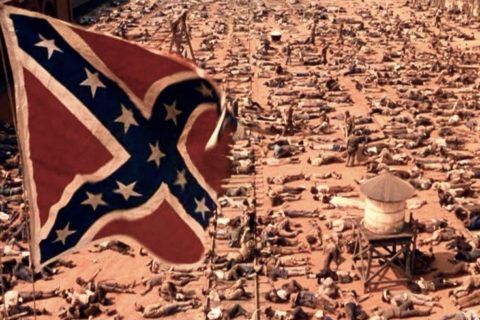Early in the War, Champ Ferguson organized a guerrilla company in Tennessee and began targeting anyone he believed supported the Union. His men also cooperated with Confederate military units led by Brigadier General John Hunt Morgan and Major General Joseph Wheeler when they were in the area, and evidence indicates that Morgan commissioned Ferguson as a captain of partisan rangers.
Stories circulated about Ferguson’s alleged violent ways, including rumors that he would sometimes decapitate his prisoners and roll their heads down hillsides. He was said to be willing to kill elderly and bedridden men. While it is a matter of dispute, Ferguson and his guerrilla band were said to be involved in killing wounded members of the 5th United States Colored Cavalry, along with their white officers, after the Battle of Saltville. The arrival of Thomas’ Legion of Cherokee Indians and Highlanders prompted Ferguson and his men to leave and reputedly prevented the complete slaughter of the prisoners.
When the War ended, Ferguson disbanded his men and returned his farm. When the Union troops learned of his return, they arrested him and took him to Nashville, where he was tried by a military court for 53 murders. The trial attracted national attention and soon became a major media event. One of Ferguson’s main adversaries, Union Captain David “Tinker” Beatty, testified against him. Beatty led his own guerrilla company against any real or suspected Confederates. Ferguson acknowledged that his band had killed many of the victims named and claimed he had killed over 100 men himself. He insisted this conduct was simply part of his duty as a soldier.
On October 10, 1865, Ferguson was found guilty and sentenced to hang. He made a statement in response to the verdict:
“I am yet and will die a Rebel … I killed a good many men, of course, but I never killed a man who I did not know was seeking my life. … I had always heard that the Federals would not take me prisoner, but would shoot me down wherever they found me. That is what made me kill more than I otherwise would have done. I repeat that I die a Rebel out and out, and my last request is that my body be removed to White County, Tennessee, and be buried in good Rebel soil.”
He was hung on October 20, 1865, one of only two men to be tried, convicted, and executed for war crimes during the War of Northern Aggression. Ferguson’s last wishes were met and he was buried in the France Cemetery north of Sparta, White County, Tennessee.
After his execution, Ferguson’s statements to the Nashville Dispatch were published and the New York Times classified his letter as a confession. He admitted to killing at least ten people, claiming that nine of these men were killed in self-defense, while he believed that one was committing murders and robbing private houses. Ferguson also wrote that he had been convicted of the murders of men who were killed by other members of his group. He denied some of the charges, including the killing of 12 soldiers at Saltville, saying that many of the men he was accused of killing died in battle or were killed by others.
Ferguson felt that his trial had been neither just nor fair; he knew he would be sentenced to death, and questioned the reliability of all but two witnesses.

Crawling out of the Everglades and guzzling a Monster energy drink.






A man among men.A true hero.I read a book on him last year and he was a man dedicated to his race,God and his cause.He brought honor and justice to those of his people who had been wronged.In our new C.S.A. lets replace all those Martin Lucifer Coon boulevards with Champ Ferguson Highways.God bless him.